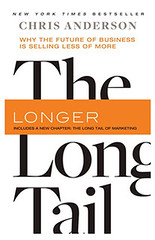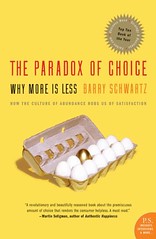Ask the Readers: Choice, a Paradox or Paradise?
Kyle Bylin, Associate Editor — (@kbylin)
There’s an essay I’ve wanted to write for quite awhile now, tentatively titled: Paradox or Paradise: Music Choice in the Digital Age; it would explore the topic as to whether or not the shift in the music landscape from scarcity to abundance has resulted in a positive or negative experience when fans purchase music.
To do this, I would compare and contrast two of the leading voices on this issue.
On one hand, there’s Psychologist Barry Schwartz, whose book The Paradox of Choice convincingly argues its subhead: how the culture of abundance robs us of satisfaction. On the other, there’s Chris Anderson, who argued in The Long Tail that “the paradox of choice is simply an artifact of the limitations of the physical world, where the information necessary to make an informed choice is lost.” Put differently, he doesn’t necessarily believe that the paradox of choice exists on the Internet; rather he thinks that it has created a rather liberating paradise of choice.
In terms of music, I think that both viewpoints hold a certain degree of credence.
Also, the essay would question why it is that we tend to start the conversation about fans and their music choices at the point of their final decision, where they either choose to buy the songs they want, or just download them for free.
In effect, we fast forward to the argument that between these two decisions, one is more ethical than the other, skipping past the increasingly relevant discussion about how they came to decide what music they wanted to buy in the first place.
We don’t try to understand if the process itself—of deciding what music to actually buy—has become straining in a way that leads to decision paralysis, causing fans to either opt out, or to just file-share the music they desire instead.
“Decision paralysis,” in the words of Made to Stick coauthor Dan Heath, “is a finding from psychology that says: The more options that we’re exposed to, the more likely we are to kind of freeze up and go with the path of least resistance.”
At a time when more music is being consumed today than ever before, yet less is being paid for; it begs to question if file-sharing has become “the path of least resistance” in a culture that’s abundant with music.
Of course, the appeal of free music is the main draw. But what about the desire that fans might have, in the face of radical abundance, to eliminate all of the symptoms associated with choice overload?
Instead of a fan experiencing regret, missed opportunities, the curse of high expectations, and self-blame—this decrease of satisfaction that comes along with an increase of options—they simply get to choose not to choose at all.
Thus, the essay would pose the question: Should we view file-sharing as a coping mechanism that fans use to reconcile the decision paralysis they experience?
Or has file-sharing simply become the most economically feasible way to explore a paradise of choice, where the amount of music available—that fans want—both exceeds their monthly disposable income, as well as, the amount of money that they would spend on music throughout their entire lifetime?
Many sites like Grooveshark, Spotify, and MOG have emerged as anwsers to this dilemma, but fans still have the urge to fill up their ever-expanding iPods
I expect that, moving forward, these are a few of the questions that will help us frame this discussion and move the conversation forward.
Now, I’m no choice theorist, and likely neither are you. But I think it would be interesting to aggregate multiple perspectives on this issue and synthesize them together. That way, we could come to an understanding as to the predominance of this problem and hopefully either confirm or challenge our beliefs.
What I’m asking of you is to join me in this discussion by either commenting below or by sending me a longer, thought-out piece in an email. Both of which, I would do my best to correspond back and forth to. The goal is to get as many opinions as possible and integrate them into the final essay.
Additionally, the sharing of any news items, research, and essays would be greatly appreciated, as would any suggestions for people to interview about this.
If you happen to have extended thoughts on this, I’d gladly consider interviewing you for this essay and posting it on Hypebot—just volunteer yourself. If you’re a music fan or artist and have a story to share about your experiences with choice overload in the digital age—feel free to share those with me too.
That said; I look forward to hearing from you and thanks.
Contact Me:
- kyledotbylinatgmaildotcom
Notes:
Though, to be sure, I’m already rather aware of the books on this subject:
- Your Brain Is (Almost) Perfect: How We Make Decisions
- Nudge: Improving Decisions About Health, Wealth, and Happiness
- How We Decide
- Blunder: Why Smart People Make Bad Decisions
- Blink: The Power of Thinking Without Thinking
- Predictably Irrational: The Hidden Forces That Shape Our Decisions
- The Art of Choosing
Some I’ve read and others I haven’t yet; the problem with a few of them being that they all tend to cite—and be based on—the same academic research papers. In addition, I would take into account the recent academic study that challenges the choice overload hypothesis entirely and further dismisses it as false.

